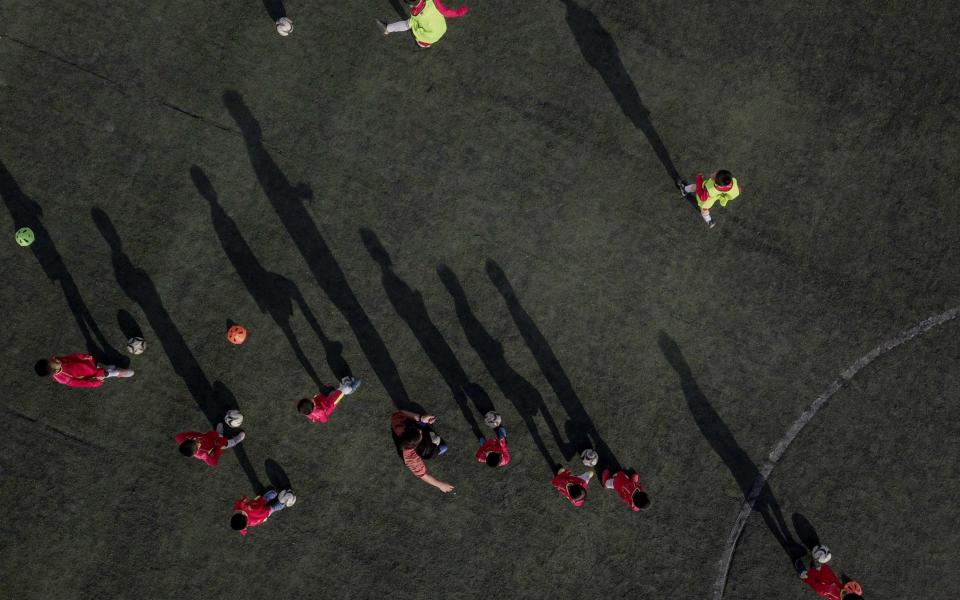FA under pressure to follow Scotland's move towards ban on heading in training for children aged under 12

The Football Association are under increasing pressure to introduce restrictions on heading in children’s football after the Scottish Football Association moved towards a training ban for under 12s.
The SFA are in the final stages of consultation before publishing new guidelines but intend to be proactive following landmark research by the University of Glasgow which found that former professional players were 3.5 times more likely to die of neurodegenerative disease.
The English FA have also launched a research taskforce that will review potential changes to the coaching and training of heading in England in order “to decrease the overall exposure to headers”. This will include exploring the introduction of prescribed limits on heading in training across the various levels of football, from full-time professionals down to children. Members of the research taskforce include Dr Willie Stewart, the lead researcher at Glasgow and Dawn Astle, the daughter of former England striker Jeff who died of what a coroner ruled was an industrial disease from heading footballs.
Astle and Dr Stewart have both consistently advocated a ban on heading among young children, restrictions in heading in training for young adults and senior amateur or professional players, improved concussion protocols as well as a concerted effort to address a care crisis among former players living with dementia.
The Scottish FA, however, is further ahead in its consultation and is imminently expected to follow the United States in becoming the first European country to confirm restrictions on heading footballs for the youngest children.
Guidelines could also be issued in respect of stopping heading in matches, as well as the amount of heading that is practiced in training by higher age groups.

The Glasgow research found differences between specific neurological diseases and dementia types, with former players respectively five, four and twice as likely to die of Alzheimer’s, Motor Neurone Disease and Parkinsons. The study followed The Telegraph’s successful campaign for specific research which definitively answered whether former players were at an increased risk of neurodegenerative disease.
The research studied 7,676 former players born between 1900 and 1976 and has found no evidence to suggest that football is now safer. "We can't wait on the evidence one way or the other on heading,” said Dr John MacLean, the SFA’s medical consultant, was also part of Dr Stewart’s Glasgow research team. "We need to take some sensible, pragmatic steps at the moment and that's largely going to be about trying to reduce that overall burden, the overall times that young players head - and heading in training is much more common than in matches.”
The FA, who part-funded the Glasgow research, had initially only pushed for improved concussion protocols. They cited how infrequently young children head the ball in matches, but that overlooked what might happen in training and how unnecessary impacts could be easily limited. The mantra now is to ensure heading quality while reducing quantity.
The Glasgow research could not pinpoint the precise cause of the increased risk of neurodegenerative disease, but there is a large and growing body of research that makes a link to head impact.
Children aged 10 and under are already banned from heading in the United States, and there is also a restriction on heading for those aged between 11 and 13.
Another striking aspect of the Glasgow research was how former professional footballers were found to have a marginally higher risk of neurodegenerative disease than former NFL players. The risk of concussions from collisions is higher in the NFL, suggesting that frequent heading - something unique to football - is another potentially significant factor. "We can't go on looking at a risk of three and a half times higher neurodegenerative disease in footballers and not do something,” said Dr Stewart. Dawn Astle hopes that heading will be globally outlawed for young children.
“We applaud them [the SFA] for trying to put things in place to reduce the risk and not keep saying ‘more research, more research’,” she said. “I hope that children in other countries mean as much to our specific FAs as clearly Scottish children do to theirs. It’s always been my belief that it manifested in my dad – although no one was aware of it – when heading footballs as a kid.”

 Yahoo Sport
Yahoo Sport 





































